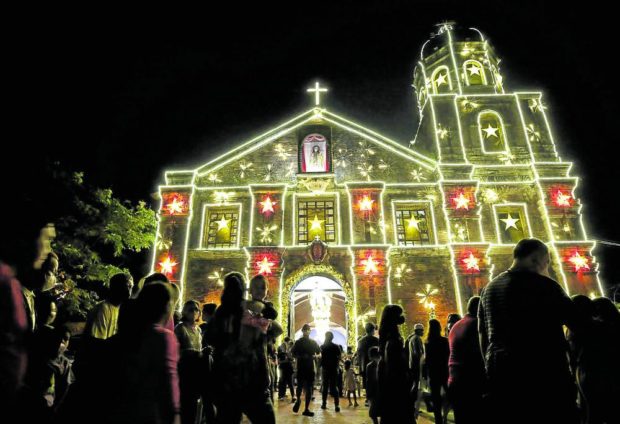
FILE PHOTO: The Catholic faithful on early Friday morning (December 16, 2022) flock to the first of the nine dawn Masses, or “Simbang Gabi,” leading to Christmas at the four-century-old St. Mary Magdalene Church in Kawit, Cavite. Philippine Daily Inquirer / Richard A. Reyes
Fulfilling the Filipino tradition of attending “Simbang Gabi” for nine consecutive days should no longer be a problem for late risers as Catholic churches nationwide will celebrate Masses either at dawn or at night.
Lingayen-Dagupan Archbishop Socrates Villegas said that Catholics may fulfill their Simbang Gabi devotion by attending Mass according to their preference.
“Let us remember that the most important component of Simbang Gabi is not the time in which it is celebrated but the participation at Mass,” Villegas stressed in a recent post on his Facebook page. “The key word is simba (Mass) not gabi (night). The indispensable part of this nine-day pre-Christmas tradition is the Eucharist.”
“Attending Mass for nine days and preferably receiving Holy Communion in the state of grace during those Masses no matter the time of the day, is the most important way to prepare for Christmas,” he added.
Villegas explained that the nine-day Masses to prepare for Christmas was “customarily done at dawn or before sunrise, hence it was called Misa de Gallo or Mass of the Rooster, which, in the general understanding, crows at dawn.”
The Simbang Gabi were also called Aguinaldo Masses because Filipino Catholics make it a vow to attend nine Masses of the Virgin Mary at dawn before Christmas “in order to thank God for the gift of Catholic faith,” he said.
But he noted that through the years, the time for celebrating the Masses has evolved, particularly during martial law in the 1970s, which led to the imposition of a curfew that prohibited Filipinos from loitering in the streets at dawn.
“The political situation at that time gave rise to the wider understanding that the more important component of Simbang Gabi is not the time of dawn but the Mass,” Villegas said.
He also corrected those who refer to the evening Mass during the period of the Simbang Gabi as “anticipated Simbang Gabi.”
“There is no such [thing]. It is important that we do not call this anticipated Simbang Gabi,” Villegas said, pointing out that the weekdays during the period of Advent have no first vespers or Masses for evening prayer.
“The only solemnities during the Christmas novena are the Sundays within. Ferial days of Advent have no first vespers; hence, the inaccuracy of calling them anticipated Simbang Gabi,” he added.
Villegas also shared that churches under the jurisdiction of the Archdiocese of Lingayen-Dagupan in Pangasinan province have replaced the traditional Advent wreaths with the “parol” or Filipino Christmas star lantern.
“The Advent wreath is a European Protestant tradition, while the Filipino parol is typically part of our Christmas traditions,” he said.
READ: ‘Simbang Gabi’: Facing COVID-19 with hope